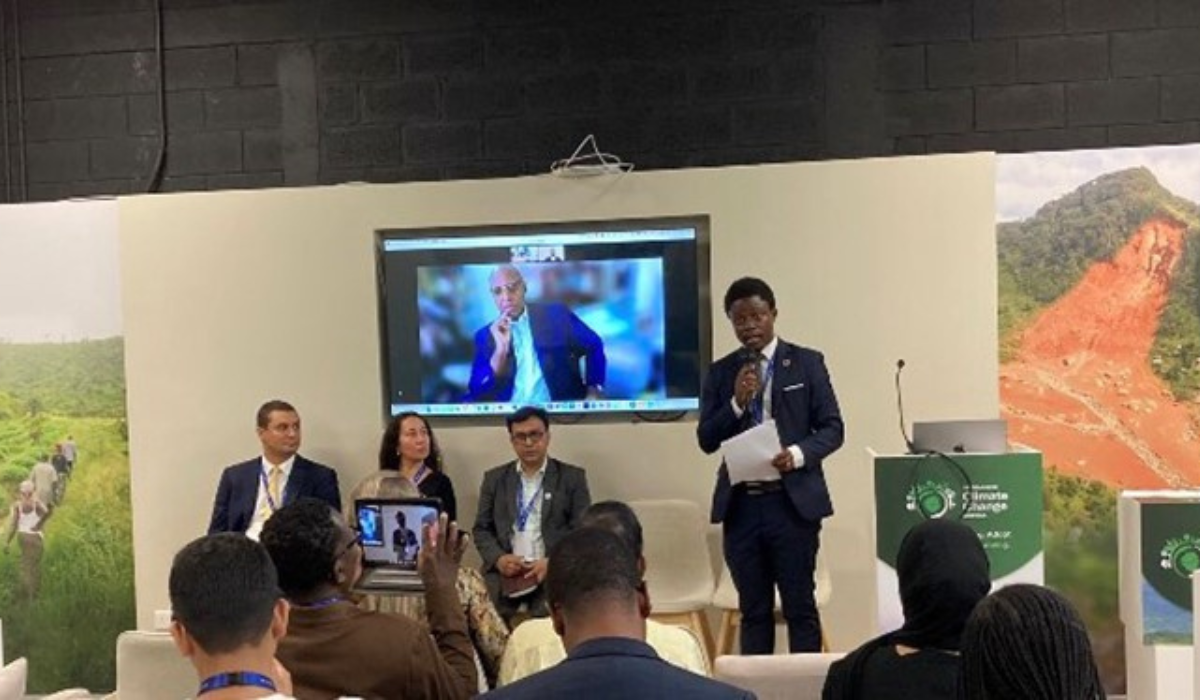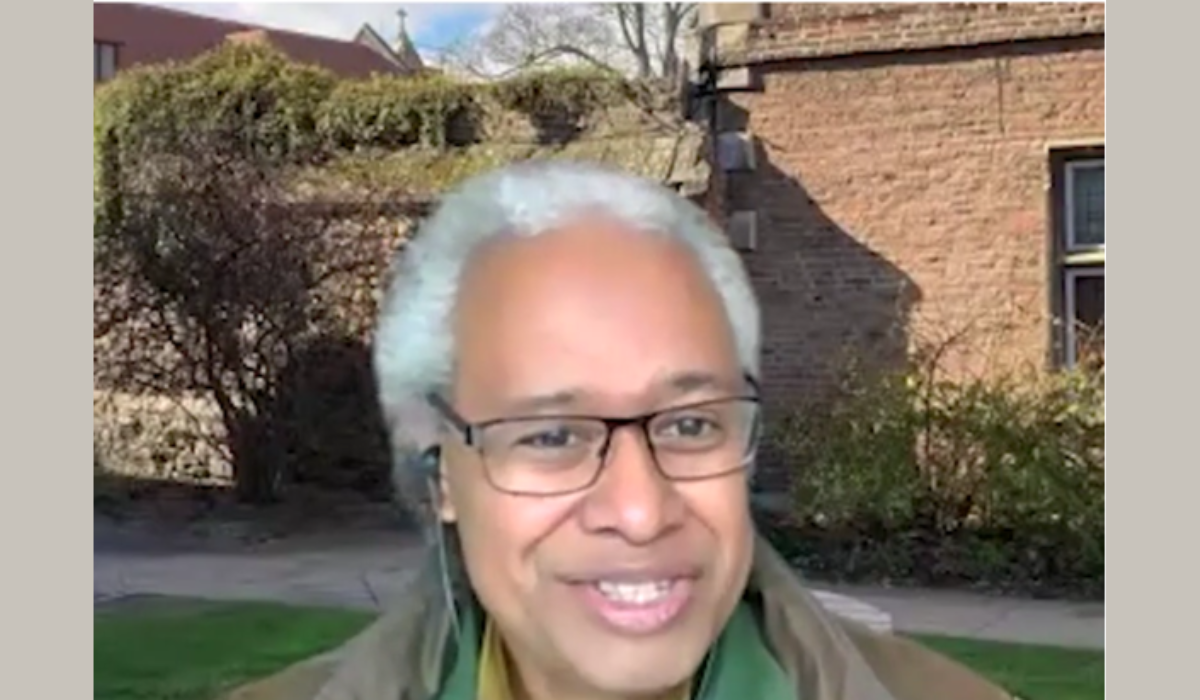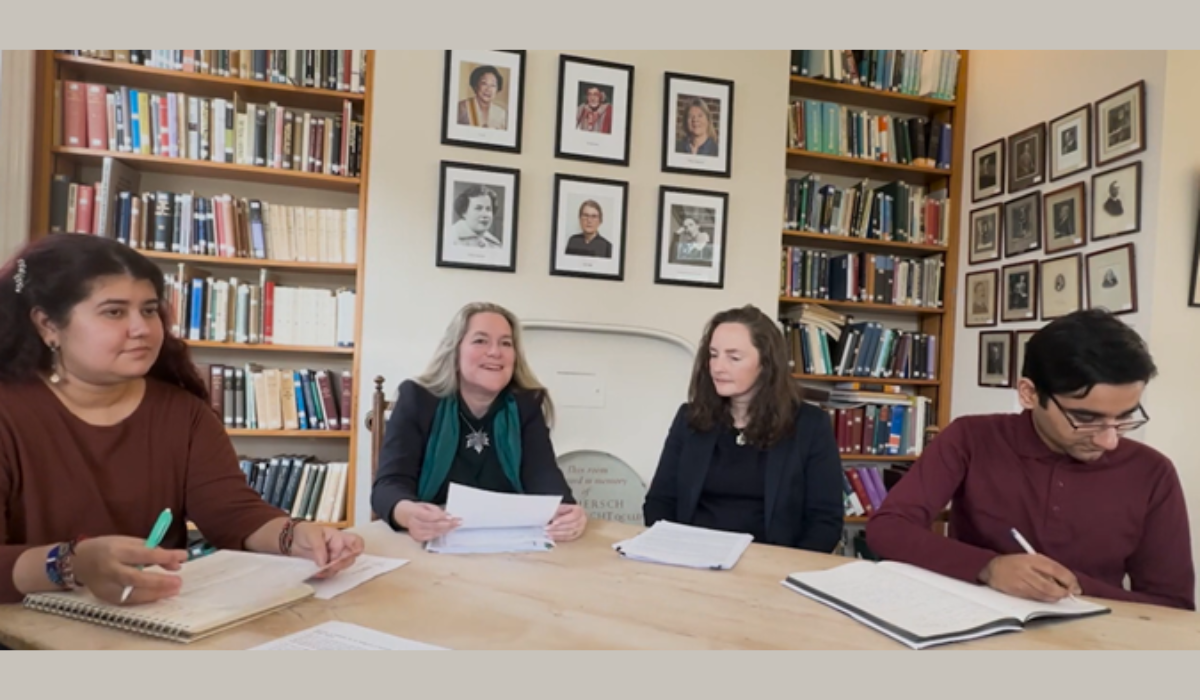Lucy hosts educational partnership to scale up climate action and resilience.
Header image: Professor Cordonier Segger, leading a supervision session on the Global Biodiversity Framework, one of the four courses offered during the first iteration of the Democratising Education for Global Sustainability and Justice Programme.
Global Crises with Differentiated Impacts: Universities Making a Difference
The triple planetary crises – pollution, climate change and biodiversity loss – affect us all. However, and more accurately, they affect some of us more than others.
Least developed, landlocked and small island countries are already suffering disproportionately from the effects of climate change. In the Caribbean and Pacific, states such as Kiribati and the Marshall Islands, low-lying atoll nations, face the existential threat of irreversible sea level rise. A country such as Bangladesh, which is producing only 0.56% of global world emissions, is ranked 7th most vulnerable country to climate change according to the 2021 Global Climate Risk Index. It is estimated that from 2000 to 2019, Bangladesh suffered economic losses worth $3.72 billion due to a record 185 extreme weather events during this period.
In this global effort to build resilient societies, academic institutions have a role to play. Beyond mobilising science, technology, finance and cooperation – awareness, education, knowledge and capacity are ever more essential to achieve the transformations we need.
Lucy Cavendish College: Standing up for Education, Global Sustainability and Justice
Lucy Cavendish College has long taken up the challenge of championing the global Sustainable Development Goals and widening participation in education, leveraging the knowledge and creativity of its world-leading faculty. As part of this commitment, Professor Marie-Claire Cordonier Segger, as Chair in Sustainable Development and Policy, as well as Law Fellow and Director of Studies for the LLM/MCL at Lucy, serves as executive secretary of the Climate Law and Governance Initiative for the UN Framework Convention on Climate Change (UNFCCC) COP29, and chair of the UN Convention on Biological Diversity COP16 Biodiversity Law and Governance Initiative. Together with Dr. Antoinette Nestor, a Law Bye-fellow and Director of Studies for visiting students at Lucy Cavendish and Engagement Manager for Cambridge Zero and the Centre for Climate Repair in the University of Cambridge, Professor Cordonier Segger has been spearheading innovative climate law and governance, making Lucy Cavendish a hub for cutting-edge research on legal and policy aspects of the Sustainable Development Goals (SDGs), including SDG 13 climate action, and SDG 14 and 15 on ocean and terrestrial biodiversity. Lucy students such as Farah Kassab, who served as Climate Law and Governance Initiative Intern, are helping young legal scholars from the Global South participate in the Climate Law and Governance essay competition, which shed light on climate policies adapted to local contexts. Building links and awareness through Lucy students and faculty members, to reach well beyond our college to current and future law and policy leaders allows academia to support and engage highly vulnerable countries.
In addition to building bridges between leaders, professionals and scholars through the annual Climate Law and Governance Day at the UNFCCC Conference of the Parties (COP), its related Climate Legal Specialisation Course and other COP engagements, also providing treaty advice to the highly climate vulnerable countries forum, Professor Cordonier Segger’s Chair also leads the Democratising Education for Global Sustainability and Justice Programme, hosted by Lucy Cavendish College with partners from across the University of Cambridge and internationally.
Democratising Education for Global Sustainability and Justice: Building on a Successful First Year
Law – through a mosaic of international agreements that advance the SDGs – offers crucial tools to address global sustainability challenges. But in order for the law to empower, it must be understood and deployed to its fullest, not just in classrooms, but in courts, claims commissions, regulatory agencies and practices all over the world, including for highly vulnerable people.
The Democratising Education for Global Sustainability and Justice (DemEd Global) programme aims to harness the potential of international law to empower communities and governments across the globe. Lucy leadership, faculty and students, including our growing cohort of LLM and MCL students, are at the heart of these efforts, in partnership with Hughes Hall and others across Cambridge led by the Bennett Institute for Public Policy; the Centre for Energy, Environment and Natural Resources Governance; and Cambridge Global Challenges. Lucy’s commitment to advance global sustainability and justice greatly benefits from the unwavering enthusiasm of senior leadership, fellowship, students and staff. Professors Henriette Hendriks and Howard Nelson are providing invaluable guidance and support, while many others from the College, including Law DOS Dr Antoinette Nestor, LLM candidate Adv Yishu Lui, Programme Coordinator Adv Maeve McDermott and Adv Tejas Rao, a PhD candidate who supervises Lucy law undergraduates, have led the development and provision of new courses online.
In the fall of 2023, after a successful pilot, the first full offering of free and accessible courses on the law and policy dimensions of sustainability reached over 2,200 learners in more than 100 countries.
Professor Cordonier Segger, leading a supervision session on the Global Biodiversity Framework, one of the four courses offered during the first iteration of the Democratising Education for Global Sustainability and Justice Programme.
Supported by a generous gift from University of Cambridge alumna Dr Gabrielle Bacon, the programme trains law and policy specialists and gives them the knowledge and skills required to implement essential treaties on all levels. These courses, provided on a scholarship basis, prioritise those from highly climate vulnerable and least developed countries (LDCs). In this spirit, in 2024, countries such as Bangladesh will benefit from scholarships to access these new online education opportunities for current and future law and policy leaders. Bangladesh led the successful drive, together with other climate vulnerable countries, to establish a new international Response Fund for Loss and Damage which was agreed at COP28 in Dubai.
Adv Hafij Khan, Executive Director of the Centre for Climate Justice-Bangladesh and Fellow of the Centre for International Sustainable Development Law reported the following:
In a world over 4°C, money alone will not mean much for those facing terrible loss and damage. These online education scholarships help current and future leaders from across Bangladesh to gain preparedness and response capacity in climate law and policy and will make a massive difference for our people.
Side Event titled “Climate Law in Highly Vulnerable Countries” at the Sierra Leone Pavilion on Sunday, 10 December 2023 during COP28. Chaired by Professor Marie-Claire Cordonier Segger, Chair of Sustainable Development Law and Policy at the University of Cambridge, and Mr Gabriel Kpaka, Climate Negotiator of Sierra Leone; featuring keynotes by Hon Jiwoh Emmanuel Abdulai and Mr Saber Hossian Chowdhury, Ministers of Sierra Leone; and including an intervention from Adv Hafij Khan of Bangladesh, member of the Warsaw International Mechanism Executive Committee for LDCs.

Side Event titled “Climate Law in Highly Vulnerable Countries” at the Sierra Leone Pavilion on Sunday, 10 December 2023 during COP28. Chaired by Professor Marie-Claire Cordonier Segger, Chair of Sustainable Development Law and Policy at the University of Cambridge, and Mr Gabriel Kpaka, Climate Negotiator of Sierra Leone; featuring keynotes by Hon Jiwoh Emmanuel Abdulai and Mr Saber Hossian Chowdhury, Ministers of Sierra Leone; and including an intervention from Adv Hafij Khan of Bangladesh, member of the Warsaw International Mechanism Executive Committee for LDCs.
In addition to these growing partnerships, which bridge the gap between leading educational institutions and governments from the Global South, educational offerings are being expanded. After proposing four courses to learn how legal principles and practices promote the world’s Sustainable Development Goals, the Paris Agreement on Climate Change, the Global Biodiversity Framework and the true cost accounting of capital, two new courses are being piloted on the World Trade Organization and on related agreements and on the Convention on the Rights of the Child.

Dr Howard Nelson, University Affiliate Lecturer and Lecturer in Conservation Leadership at Cambridge University, delivering a module in the Global Biodiversity Framework Course
Haiti also hopes to benefit from future cooperations. Adv Jean Idonal Caze, Transparency Focal Point for the Ministry of Environment of Haiti, explained why these courses have the potential to make a difference for his country:
Haiti is considered both a Least Developed Country and a Small Island Developing State. It is also ranked third in the most highly vulnerable countries to climate change and is a victim of climate hazards, as well as socio-economic crises. Given this intrinsic vulnerability, we cannot afford to overlook the science and skills learned in the DemEd Global programme, which inform decision-making processes that can ultimately address environmental changes that threaten our existence as a people.
Applications Open Now
The Democratising Education for Global Sustainability and Justice programme is delighted to announce that applications for the Spring session are now open. Current and future law and policy leaders from any sector and any country, anywhere in the world, and especially in the Global South, are now able to register to be considered for selection using the links below.
- Key Essentials: The Paris Agreement, Sustainable Development and the Law
o Run Dates: 15 April - 28 April 2024
o Link to Express Interest: https://www.eventbrite.ca/e/the-paris-agreement-sdgs-and-the-law-online-course-express-interest-tickets-801567900167
o Deadline to Apply: 14 March 2024 (Thursday), 11:59pm GMT
- Key Essentials: The Global Biodiversity Framework, Sustainable Development and the Law
o Run Dates: 6 May - 19 May 2024
o Link to Express Interest: https://www.eventbrite.ca/e/biodiversity-sustainable-development-and-the-law-course-express-interest-tickets-801598782537
o Deadline to Apply: 14 March 2024 (Thursday), 11:59pm GMT
- Key Essentials: Trade Rules, Sustainable Development and the Law
o Run Dates: 27 May - 9 June 2024
o Link to Express Interest: https://www.eventbrite.ca/e/wto-agreements-sdgs-and-the-law-course-express-interest-tickets-801740596707
o Deadline to Apply: 25 April 2024 (Thursday), 11:59pm GMT
- Key Essentials: The Children’s Rights Convention, Sustainable Development and the Law
o Run Dates: 17 June - 30 June 2024
o Link to Express Interest: https://www.eventbrite.ca/e/rights-of-the-child-sdgs-and-the-law-course-express-interest-tickets-801780155027
o Deadline to Apply: 25 April 2024 (Thursday), 11:59pm GMT
Each short online course provides tailored recorded modules featuring renowned professors and experts in key fields; carefully curated open-access resources; digital summaries of key materials; and assessments. Through live sessions, learners meet experts and course instructors and have the opportunity to engage with fellow members of their cohort, building and strengthening new communities of practice, and professional networks worldwide.
The Programme Committee and Operational Team
The Cambridge-based Programme Committee, under the leadership of Professor Marie-Claire Cordonier Segger, Chair in Sustainable Development Law and Policy at the University of Cambridge, with the advice and guidance of Dr Markus Gehring, Law Fellow of Hughes Hall and Associate Professor in the Faculty of Law, is shaping and strengthening capacity to address global sustainability challenges, worldwide, through these efforts.
Thanks also to Adv Maeve McDermott, Programme Coordinator; Adv Tejas Rao, Research Coordinator; and Thalsa-Thiziri Mekaouche, Research and Programme Assistant.
Support the Programme
To find out more, especially if interested in supporting the programme, please write in the first instance to the Research Coordinator, Tejas Rao: tr465@cam.ac.uk.
If you are a student at Lucy Cavendish, you are invited to join us for the filmed supervision sessions in the coming weeks, during which you will have the opportunity to interact with world-leading experts on cutting-edge legal practices in the field of sustainable development. If interested, please reach out to Tejas Rao at tr465@cam.ac.uk.




